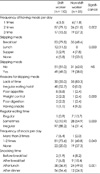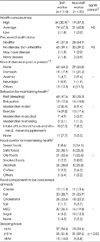Abstract
Purpose
The purpose of this study was to investigate the stress, dietary habits, dietary behaviors, and health-related behavior of nurses.
Method
The subjects of this study were 161 nurses studying at a cyber university. The general characteristics, stress, dietary habits, dietary behaviors, and health-related behavior of the subjects were surveyed using a self-administered questionnaire in October, 2010. The subjects were divided into two groups according to the working pattern: shift workers (n = 110) and non-shift workers (n = 51).
Results
In the general characteristics, there were significant differences in marriage, monthly income, employment type, and job satisfaction between the two groups. Total stress score did not differ significantly between the two groups. In dietary habits, significant differences in meal regularity, skipping meals, skipping reasons, having regular mealtimes, frequency of snack and the snack time between shift workers and non-shift workers (p<0.05). Total score of dietary behaviors in shift workers was significantly lower than that in non-shift workers (p<0.05). Score of shift workers in taking three meals per day regularly was significantly lower than that of non-shift workers. In health-related behavior, a significant difference in sleeping time was observed between shift workers and non-shift workers. Dietary behavior showed negative correlation with shift work (r = 0.176) and positive correlation with health consciousness (r = 0.210) and perceived health status (r = 0.198) in subjects after adjustment for age, marriage, monthly income, and employment type (p < 0.05). Multiple regression analysis revealed that shift work, health consciousness, and perceived health status affected dietary behavior in subjects.
Figures and Tables
References
1. Park IS. A study on health promotion lifestyles [dissertation]. Pusan: Pusan National University;1995.
2. Yun JY, Ham OK, Cho IS, Lim JY. Effects of health promoting behaviors and mental health status of shift and non-shift nurses on quality of life. J Korean Acad Public Health Nurs. 2012; 26(2):268–279.

3. Lee KJ, Kim MR, Lee AS, Lee JH, Jang YH, Jung MS. Research about development of working type for improving work conditions on nursing. Report of service for working nurses of hospitals. Seoul: 2006.
4. Park JS. The prevention of industrial fatigue and health care in the shift workers. Ulsan: Korea Occupational Safety & Health Agency;1993.
5. Akerstedt T. Psychological and psychophysiological effects of shift work. Scand J Work Environ Health. 1990; 16:Suppl 1. 67–73.

6. Lee SY, Kim YM. The impact of stress and sleep in shift nurses. Proc Cathol Sangji Coll. 2004; 30:157–176.
7. Sung MH, Yoon GS. Fatigue and its related factors among shift work nurses. Health Sci. 2011; 3:22–36.
8. Kim HC, Kwon KS, Koh DH, Leem JH, Park SG, Shin JY, Lee YC, Kim YK. The relationship between job stress and psychosocial stress among nurses at a university hospital. Korean J Occup Environ Med. 2006; 18(1):25–34.

9. Hardy GE, Shapiro DA, Borrill CS. Fatigue in the workforce of National Health Service Trusts: levels of symptomatology and links with minor psychiatric disorder, demographic, occupational and work role factors. J Psychosom Res. 1997; 43(1):83–92.

10. Wall TD, Bolden RI, Borrill CS, Carter AJ, Golya DA, Hardy GE, Haynes CE, Rick JE, Shapiro DA, West MA. Minor psychiatric disorder in NHS trust staff: occupational and gender differences. Br J Psychiatry. 1997; 171:519–523.

11. Suzuki K, Ohida T, Kaneita Y, Yokoyama E, Miyake T, Harano S, Yagi Y, Ibuka E, Kaneko A, Tsutsui T, Uchiyama M. Mental health status, shift work, and occupational accidents among hospital nurses in Japan. J Occup Health. 2004; 46(6):448–454.

12. Ko JW, Yom YH. The role of social support in the relationship between job stress and job satisfaction/organizational commitment among hospital nurses. J Korean Acad Nurs. 2003; 33(2):265–274.

13. Lee KA. A comparison of eating and general health practices to the degree of health consciousness in Pusan college students. J Korean Soc Food Sci Nutr. 1999; 28(3):732–746.
14. Kim JH, Lee MJ, Yang IS, Moon SJ. Analysis of factors affecting Korean eating behavior. Korean J Food Cult. 1992; 7(1):1–8.
15. Lee JT, Lee KJ, Park JB, Lee KW, Jang KY. The relations between shiftwork and sleep disturbance in a university hospital nurses. Korean J Occup Environ Med. 2007; 19(3):223–230.

16. Zhao I, Turner C. The impact of shift work on people's daily health habits and adverse health outcomes. Aust J Adv Nurs. 2008; 25(3):8–22.
17. Kim HK, Lee TY, Kim KH. The effects of health promotion behavior of shifting nurses' on the health conditions. J Korea Acad Industr Coop Soc. 2010; 11(3):1126–1132.

18. Yoon HS, Choi YY. Stress level and health-related behavior of nurses working in the Kyungnam area. Korean J Community Nutr. 2003; 8(5):781–793.
19. Kim WY, Cho MS, Lee HS. Development and validation of Mini Dietary Assessment Index for Koreans. Korean J Nutr. 2003; 36(1):83–92.
20. Lee SL, Kim SJ. Health-related factors and nutritional status in shift-workers at coffee shops: focused on single women in twenties in Seoul. Korean J Community Nutr. 2013; 18(5):467–477.
21. Kim JH, Lee MJ, Moo SJ, Shin SC, Kim MK. Ecological analysis of food behavior and life-styles affecting the prevalence of depression in Korea. Korean J Nutr. 1993; 26(9):1129–1137.
22. Choue RW, Hong JY, Lee HW, Lee SL. A study on the necessity and development of nutritional consultation during medical examination of employees and of worksite nutrition programs. J Korean Diet Assoc. 1996; 2(1):20–28.
23. Kim H, Moon S, Lee K. Nutritional and health status of nurses, medical doctors and factory workers. Korean J Nutr. 1980; 13(3):126–133.
24. Bilski B. Influence of shift work on the diet and gastrointestinal complains among nurses. A pilot study. Med Pr. 2006; 57(1):15–19.
25. Sudo N, Ohtsuka R. Nutrient intake among female shift workers in a computer factory in Japan. Int J Food Sci Nutr. 2001; 52(4):367–378.
26. Choi SK, Lee KS, Lee JW, Koo JW, Park CY. Health behavior practices and needs for health promotion program according to shift work pattern in subway workers. Korean J Occup Environ Med. 2003; 15(1):37–51.

27. Seo JS. Relationship between health perception and health status of clinical nurses. Korean J Rehabil Nurs. 2002; 5(1):71–85.
28. Breslow L, Enstrom JE. Persistence of health habits and their relationship to mortality. Prev Med. 1980; 9(4):469–483.

29. Yoon HS, Choi YS. Analysis of correlation among health consciousness and nutrition knowledge, dietary habits and nutrition attitudes of elementary and middle school teachers in Masan city. Korean J Nutr. 2002; 35(3):368–379.
30. Suh ES, Kim IS, Kwon TB. The effect of living custom of health, exercise, etc on the health 1 A study on nutrient intake. Korean J Gerontol. 1994; 4(2):71–76.
31. Sim KS, Lee KH. The effect of nutrition education on nutrition knowledge and health improvement in dyslipidemic industrial employees. J Korean Diet Assoc. 2012; 18(1):43–58.

32. Occupational Health Clinics for Ontario Workers Inc. (CA). Shiftwork: health effects & solutions [Internet]. Ontario: Occupational health clinics for Ontario workers Inc.;2005. cited 2014 Jul 28. Available from: http://nupge.ca/sites/nupge.ca/files/Shiftwork.pdf.




 PDF
PDF ePub
ePub Citation
Citation Print
Print









 XML Download
XML Download